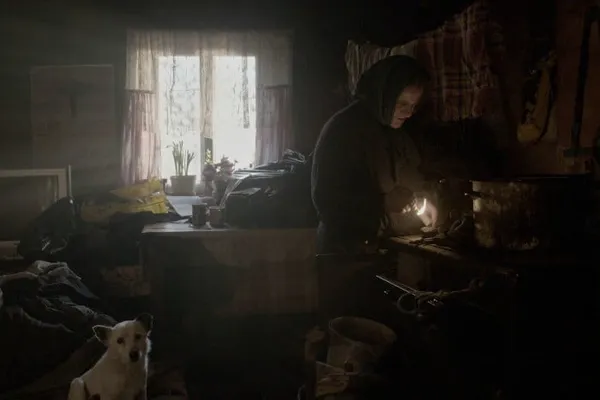Eye For Film >> Movies >> Bucolic (2021) Film Review
Bucolic
Reviewed by: Mateusz Tarwacki

In literature “bucolic” means a lyrical-epic work referring to the life of shepherds, and more colloquially is a substitute for a rural idyll or a pastoral. However, Karol Palka's Bucolic is not idealised – it is rather a picture of an idyll that has not been subjected to modern renovation. It is as if the story of the Polish artist was mixed with the deep past of the countryside, struggling with economic problems and with modernity, trying to get into this enclave of olden times without success.
The life of Danusia and her daughter Basia is peaceful, although it is hard to call it idyllic. The women live in seclusion, they don't even have running water or a bathroom, and the only guests who visit them are a priest – traditionally coming to each household with a Christmas carol once a year – and a postman. The electricity in an old, cluttered house seems foreign, even though its presence is clear. When the women prepare for the priest's arrival, the cross and candles are placed in the centre of the hut – on the table, next to the TV set. Deep sadness flows from Palka's picture. As if under the influence of a curse or a crack in the warp of time and space, the past and the present were fused together in a not very successful marriage. But although Danusia and Basia sometimes resemble witches from old rural legends, for example when Danusia tries to heal one of her many dogs with some homemade potion or when Basia dances by the fire at night, there is no magic in their lives – just poverty and loneliness.

Bucolic is a film that demythologises the Polish, idyllic countryside. It is an image that shows the world slowly fading into oblivion, completely out of step with modernity, full of stories about dreams, imps and ghosts. Palka's Bucolic resembles a place taken from the films by Andrei Tarkovsky or Bela Tarr – a place on the verge of mystical experience, yet rooted in the mundane.
The life of Danusia and Basia is defined by constant waiting and repetition, recurring seasons, customs and caring for animals. It is a slow life – so different and far from living in the city, access to media and constant contact with people. It seems that the Polish documentary filmmaker could not withstand the pressure of this eternal waiting and, simply, boredom - looking for something more in the lives of his heroines than there is in reality. And yet the real modern bucolic is places like the house of Danusia and Basia – devoid of magic, but brutally real.
Reviewed on: 10 Aug 2021















